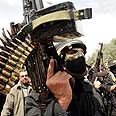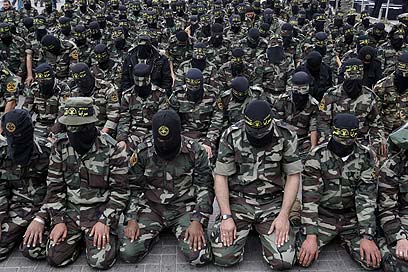
Islamic Jihad militant
צילום: רויטרס
Islamic Jihad at the service of Iran
Escalation of violence in south puts spotlight on extremist Palestinian organization behind some of the most brutal terror attacks Israel has seen
The Grad rockets that hit Ashdod and Beersheba this week were launched by terrorists from Islamic Jihad's armed wing, as were the numerous mortars fired towards the western Negev. Four of the five terrorists killed by Israel on Wednesday were longtime Jihad members who had been firing rockets and mortars at Israel since the days of the second Intifada.
As opposed to Hamas, Islamic Jihad is a small, tight-knit organization with a particularly extremist agenda based on nationalism and religious fervor. Its members completely reject Israel's right to exist, and believe the only way to liberate "all of Palestine" is through armed Jihad, or holy war.
The group's uncompromising position led to increasing tensions with the Palestinian Authority, so much so that its leader in Damascus, Ramadan Shalah, recently warned of a "third Nakba" due to the PA's "insistence" to engage in peace talks with Israel.
The Arabic term "Nakba", meaning catastrophe, is used to describe the expulsion of Palestinians from their homes in 1948 and the subsequent creation of the Israeli state.
Shalah, who took over as the leader of Islamic Jihad following the killing of its former chief Fathi Shaqaqi in Malta in 1995, claims that in order to prevent another "Nakba" all Palestinians must rally around the idea of Jihad.

Islamic Jihad militants during training (Photo: AP)
"What is the meaning of the (PA's) insistence on negotiating (with Israel)?" Shalah told a conference in Gaza a few months ago. "We sense a big conspiracy and warn against the talks between the PA and the occupation."
During the conference Shalah also spoke out against the recognition of the State of Israel and warned of the possible "eradication" of the Palestinian issue.
From the mid-1990s until 2006 Islamic Jihad's extensive terror infrastructure in the West Bank - mainly in Jenin, Tulkarem and Hebron – resulted in some the most lethal terror attacks Israel has ever seen, including the suicide bombing of the Maxim restaurant in Haifa in 2003 and the suicide attack at the Beit Lid Junction in 1995.
Islamic Jihad's terror infrastructure was all but destroyed by the IDF and, later on, by the Palestinian security forces, forcing it to move the center of its terror activity to Gaza.
Opposed to ceasefire
Like Hamas, Islamic Jihad is divided into a political wing and an armed branch – the Al-Quds Brigades. However, unlike Hamas, Islamic Jihad did not take part in the 2006 elections in Gaza. Thus, it can continue firing rockets and mortars at Israel with Hamas' quiet support.Islamic Jihad's extremist agenda guarantees it broad financial aid from Iran, which is estimated at a few million dollars a year. This support allows the Palestinian terror group to smuggle large amounts of weapons through underground tunnels along Gaza's border with Egypt, as well as manufacture "Al-Quds" rockets, which are similar to the Qassams in their capabilities.
Islamic Jihad was opposed to the unofficial ceasefire between Israel and Hamas, which went into effect following the IDF's offensive in Gaza in the winter of 2008-2009, and demanded the continuation of rocket attacks on the Jewish state. In many cases Islamic Jihad terrorists were detained by Hamas security forces as they were preparing to launch rockets, and reports of clashes between members of both organizations are not uncommon.
However, whenever Hamas is interested in escalation, it gives Islamic Jihad the green light to fire rockets at Israel.
- Follow Ynetnews on Facebook










